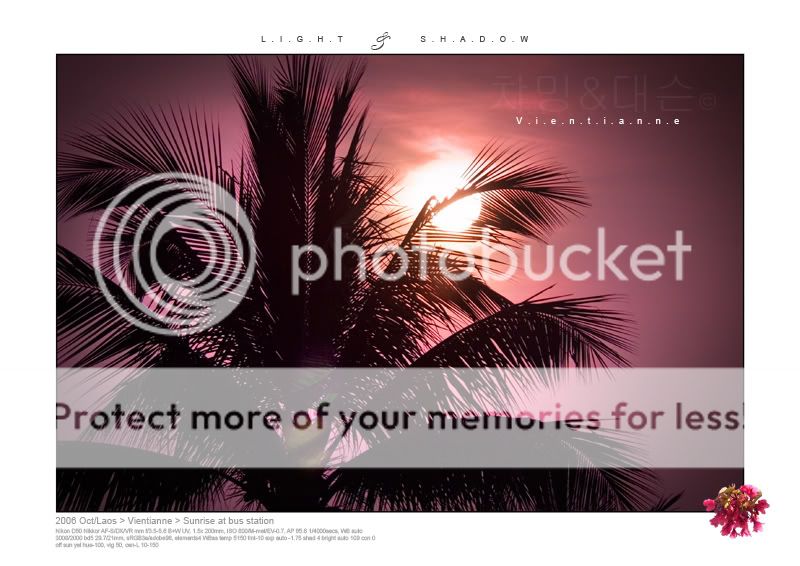Hi...i have on hand a 24-70mm F2.8 USM lens for my Bali trip. can someone pls adv what i should do to take good sunrise and sunset shots . Pls give me some tips...what f stop should i use...?tks..
How to take good sunrise/sunset shots?
- Thread starter rocksnstones
- Start date
You are using an out of date browser. It may not display this or other websites correctly.
You should upgrade or use an alternative browser.
You should upgrade or use an alternative browser.
- Status
- Not open for further replies.
a good tripod and an early wake-up alarm will do.
Shoot on the wide end of the lens and if you want, use f8 - 16 and set the timer. Njoy the sunsets/ rises

Shoot on the wide end of the lens and if you want, use f8 - 16 and set the timer. Njoy the sunsets/ rises

Hi...i have on hand a 24-70mm F2.8 USM lens for my Bali trip. can someone pls adv what i should do to take good sunrise and sunset shots . Pls give me some tips...what f stop should i use...?tks..
i'm not a typical beach sunset kind of person, but i guess more important question is what do you visualised as nice photos, before seeking the technical aids.
i guess most will settle with a full or semi-silhouette. i thought depth of field is usually not the most pertinent issue as most subjects are far away anyway.
1. exposure: meter at midtone, usually some distance from the sun, not on the sun, neither at the shadow or backlit subjects (or do so with -EV), if possible, retain and balance exposure with grad ND if slow overall exposure is not compromised by handheld instability. in lowlight non dynamic subject theme, consider tripod. consider flash if you dun mind harsh light on subject (if nearby within 2m) and shadows in adjacent foreground.
2. subject interest: try to plan for some interesting foreground silhouette, do not settle for a plain shoreline, sea, horizon, sky and sun composition. have patience with timing and not shoot too late when it is too dark.
3. standards: focus correctly at semi-far subject, such as foregound people. ensure stability on low light condition.
anyone can add anything else?
I always don't dare to point my lens at the sun
cos the sunshine will damage the lens coating
You sure??
who told you that?? :bigeyes:I always don't dare to point my lens at the sun
cos the sunshine will damage the lens coating
agreed with SniperD, zoossh and trucatus

Sometime we have to go against the rules to be creative....




eh....read it from some photography books...
I only heard of never leave cameras and lens in the car park under hot sun.eh....read it from some photography books...
and films too.
I always don't dare to point my lens at the sun
cos the sunshine will damage the lens coating
I know you should never aim a lens like a telephoto and look at it with your eyes as it will be damaging. You sure it was not referring to this? If not all those who shot alot of sunrise and sunset will be throwing away their lens at the end of each session heheheh.... sorry it just don't add up neither did google throw up any new theories on sun ray damaging lens.
If you dun point at the sun then the sunlight won't fall onto the lens meh?:dunno:
I always don't dare to point my lens at the sun
cos the sunshine will damage the lens coating
one more thing that i forgot and as you can see from various examples.
when the sun is in high intensity, esp shortly after sunrise, it got to be hidden partially behind foreground objects to reduce the intensity and break the rays. if not it would be too bright, causing an overall overexposure and relative underexposure of the foreground.
when the sun is in high intensity, esp shortly after sunrise, it got to be hidden partially behind foreground objects to reduce the intensity and break the rays. if not it would be too bright, causing an overall overexposure and relative underexposure of the foreground.
an example. sunrise requires a supplementary interest which is the oar and the reflections break by ripples.

care to share how u reduced the glare surrounding the sun? im pretty sure there was a glare... GND, looks like it to me at least?
care to share how u reduced the glare surrounding the sun? im pretty sure there was a glare... GND, looks like it to me at least?
yes. GND
- Status
- Not open for further replies.
Similar threads
- Replies
- 0
- Views
- 112
- Replies
- 3
- Views
- 998
- Replies
- 0
- Views
- 297
- Replies
- 0
- Views
- 245




